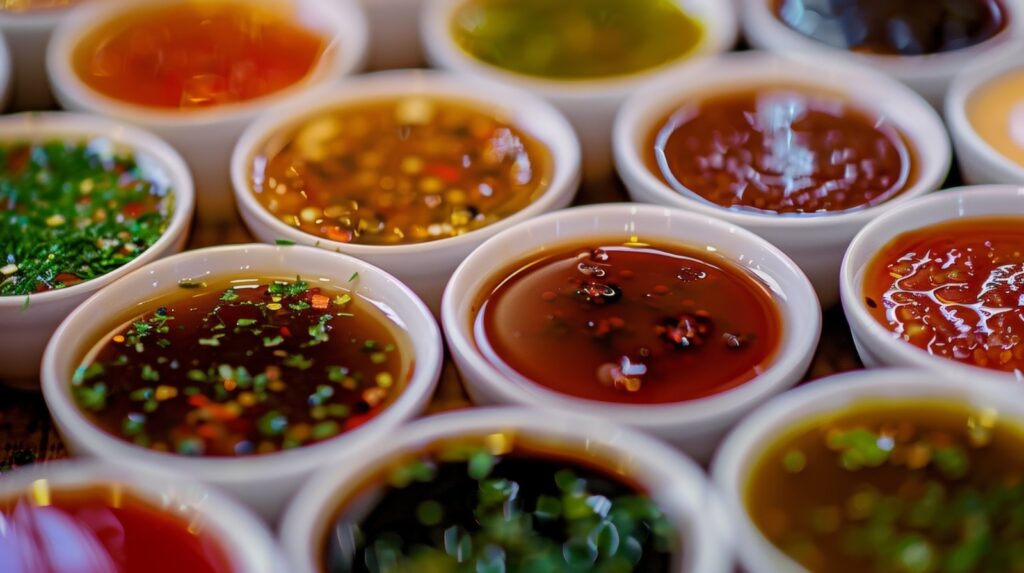
Marinades and rubs are the foundation of flavorful cooking, offering an easy way to elevate your dishes with depth, aroma, and texture. These methods infuse ingredients with robust flavours, whether grilling, roasting, or pan-frying. Chef Abdul, a culinary expert, says, “Marinades and rubs are the essence of great cooking—they enhance ingredients and bring out their natural best.”
Here’s a guide to the different types of marinades, rubs, and simple recipes to transform your cooking.
Marinades
What is a Marinade?
A marinade is a liquid or semi-liquid mixture to flavour and tenderise food. It typically consists of:
Types of Marinades
These use acids like lemon, vinegar, or tamarind to tenderise and flavour ingredients.
Lemon-Garlic Marinade
Best For: Chicken, fish, and vegetables.
Chef Abdul’s Tip: “Acidic marinades work best for tougher proteins, but don’t over-marinate delicate items like fish—it can break them down too much.”
Yoghurt marinades are rich and creamy, gently tenderising proteins with their lactic acid content while adding a mild tang.
Indian-Style Yogurt Marinade
Best For: Chicken and lamb.
These rely on oils to infuse subtle flavours into vegetables and seafood while keeping them moist during cooking.
Herb-Olive Oil Marinade
Best For: Fish, shrimp, and vegetables.
Fruits like pineapple, kiwi, or papaya contain natural enzymes that tenderise meat quickly.
Tropical Pineapple Marinade
Best For: Chicken and shrimp.
Chef Abdul’s Tip: “Enzymatic marinades are powerful—limit marination time to 30 minutes to avoid over-softening.”
Rubs
What is a Rub?
A rub is a mixture of spices and seasonings applied to the surface of the food to enhance its flavour. Unlike marinades, rubs don’t tenderise but create a delicious crust when cooked.
Types of Rubs
Dry rubs are made of ground spices, herbs, and seasonings. They’re perfect for grilling or roasting.
Classic BBQ Dry Rub
Best For: Chicken, lamb, and vegetables.
A wet rub combines spices with oil or other liquids to form a paste that sticks to the surface of the food.
Garlic-Herb Wet Rub
Best For: Chicken thighs and roasted vegetables.
These focus on aromatic spices to deliver bold flavours.
Middle Eastern Spice Rub
Best For: Chicken and lamb kebabs.
Chef Abdul’s Tip: “Spice-based rubs pair beautifully with yoghurt marinades for a layered flavour profile.”
The sugar caramelises during cooking, creating a sweet and smoky crust.
Honey-Mustard Rub
Best For: Chicken wings and salmon.
Tips for Using Marinades and Rubs
Chef Abdul’s Insight: “Think of marinades and rubs as building blocks—combine them strategically to create bold, balanced dishes.”
Recipe Spotlight: Tandoori Chicken with Spiced Yogurt Marinade and Dry Rub
Ingredients:
Method:
“Marinades and rubs are like secret weapons in cooking,” says Chef Abdul. “They allow you to bring global flavours to your kitchen and transform everyday ingredients into gourmet dishes.”
Try these recipes and tips to explore the endless possibilities of marinades and rubs. What’s your go-to recipe? Share your creations in the comments below!
Chef Abdul © Copyright 2024. All rights reserved.